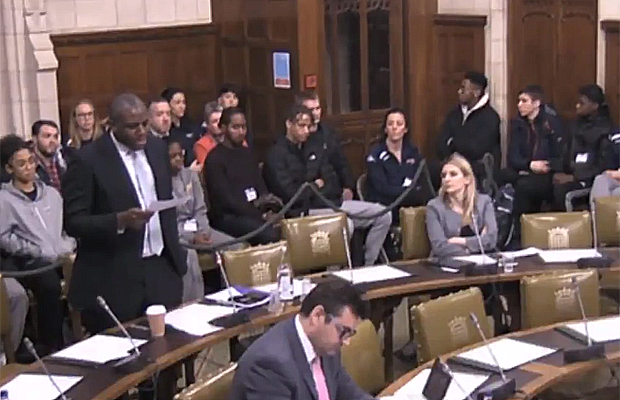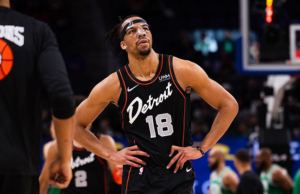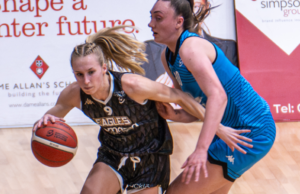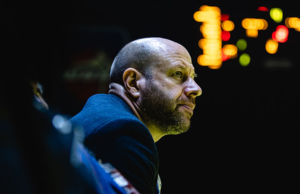11 Key Talking Points from the Parliament Debate on British Basketball Funding

The first Parliament debate on basketball funding in the UK in five years took place on Tuesday morning, as MP’s spoke on the state of basketball across the country for 90 minutes.
The debate was driven by the All-Party Parliamentary Group (APPG) on Basketball, having been commandeered by Co-Chair of the APPG Basketball, Alex Sobel MP. A number of different MPs took to the stage to put across their points of view, whilst being listened to by Tracey Crouch the government minister for Digital, Culture, Media and Sport.
It comes in response to British Basketball’s latest funding crisis, that will see them withdraw from competitions unless they find a source of income soon.
For those that missed it, we’ve pulled our key-talking points – aside from some truly horrendous puns (!) – from the debate to get you up to speed.
In no particular order, here’s our 11 key talking-points from the Parliament debate on British basketball funding:
1) A Short-Term Solution is Needed Immediately
During Alex Sobel’s opening remarks, of his three recommendations (the other two follow below) the priority was coming up with “a short-term solution for the next three seasons so that GB players can stay on the court”.
With time fast running out – the British Basketball Federation (BBF) need to come up with £70,000 in the next couple of months if the GB Senior Men are going to be able to fulfil the June/July FIBA World Cup qualifying window – the federation needs a bailout quick-time to prevent the sport being dragged into a hole that could take close to a decade to get out of.
Withdrawal from qualifiers will lead to suspension of the BBF from FIBA for two years; all Senior and age group teams will be forcibly removed from competition – and then be in Division C having to gain promotion when they do attempt to make a return.
It would not be an over-exaggeration to say if the money is not found it could be an end of the Great Britain basketball programmes as we know them for a very long time.
2) MPs Want a Review of Elite Funding Policy
UK Sport’s ‘no compromise’ funding criteria has always been laid out in black and white; they fund Olympic medal-hopes and medal-hopes only. Under this criteria, it is hard for anyone to make the argument that GB deserve funding any time soon.
However, an argument that has been gaining steam ever since the Olympics, is to change that funding criteria. Do we want to be a nation that only funds sports that have medal-hopes (which often end up being elitist in disciplines that don’t have as much competition; hence being easier to get on the podium) or do we want to fund sports that have greater participation numbers with far-wider societal impact?
There does seem to be light at the end of this tunnel; The Times exclusively revealed that UK Sport will be reviewing this policy, reporting that the UK Sport board is to meet next month to review whether the £32 million funding for Britain’s Winter Olympic and Paralympic sports is the best use of that money.
Meanwhile, Crouch responded the UK Sport funding policy is most certainly not a closed book, though it will be at least two years before a change can be made (post-Tokyo 2020).
“It is important to say that no funding criteria have been set beyond Tokyo 2020,” Crouch commented.
“UK Sport will begin its Paris 2024 funding cycle in due course. Criteria will be reviewed, offering the opportunity to reflect on the existing strategy of investment for the next cycle. UK Sport will then publish a clear set of investment principles against which future awards will be made. I hope that that reassures Members that this is not a closed book.”
3) There is a Huge Push for 3×3 Funding
With 3×3 recently having been accepted into the 2020 Tokyo Olympic games, and expected to feature in the Birmingham Commonwealth Games, there has been a distinct lack of 3×3 emphasis from the BBF and home nations in recent years.
Our 3×3 basketball venue looking as picture perfect as ever there! #Birmingham2022 https://t.co/X7KbZuooLi
— Birmingham 2022 (@birminghamcg22) February 12, 2018
However, it finally looks as though that is about to change, with it being a key point of discussion during the debate.
Sobel revealed that the BBF wrote to UK Sport in June of last year to meet regarding 3×3 funding, but did not have a meeting until January of this year, adding:
“I am sure that UK Sport will say that Basketball GB did not apply, which is true, but it took six months for UK Sport to engage with Basketball GB, and support was not forthcoming to put in a comprehensive application for Olympic funding. Basketball GB is waiting for UK Sport to confirm that they will support them in the process. We are missing an opportunity with 3 on 3.”
One of his key recommendations asked for an urgent review in the potential of 3 on 3.
“I would like the Minister to intervene and recommend that UK Sport undertakes an urgent review of the potential of 3 on 3 and that funding is made available for a development programme for a 3 on 3 squad for Tokyo,” Sobel added.
Of all the things Crouch responded to, the 3×3 route seemed to be the most positive, indicating a willingness to engage in further conversations around it.
“I am happy to look further into that,” Crouch replied. “Particularly since the qualification process will not be confirmed until early next year. That will have a huge impact on the shape of the competition. Indeed, that issue was one of the key asks in his speech. I hope that I have reassured him that I will take that away.”
4) England & Scotland’s Positions in the Commonwealth Games Could Be Under Threat
As part of the case, there were two letters from FIBA used to add clout which were later published on Twitter by Matt Slater, the Press Association’s Chief Sports Writer.
The second we’ll go into below, but the first, from FIBA Executive Director of Europe Kamil Novak, let Crouch know that both England and Scotland’s teams could face expulsion from the Commonwealth Games should GB not fulfil their qualifying windows.
“I revert to the FIBA October letter sent to British Basketball that England and Scotland’s Commonwealth Games participation could still be under threat if Great Britain basketball cannot fulfil it senior fixtures in the next windows,” Novak wrote.
“This would be a significant let down for the athletes already selected, now in training and ready to travel to the Gold Coast.”
Two letters from international fed FIBA on GB basketball’s funding crisis. One spells out threat to Eng/Scot slots at Commonwealths, 2nd is interesting comment on UKS funding model from senior global sports boss. pic.twitter.com/1Z8C3EPYOF
— Matt Slater (@mjshrimper) February 20, 2018
He added:
“The consequences of withdrawing will have a severe impact on the long-term future of basketball in your country.”
Meanwhile, basketball journalist Mark Woods has rebutted their claims, saying his sources have told him that is not the case at all.
MPs were claiming in Parliament this morning that FIBA had told them England and Scotland could be kicked out of Commonwealth Games basketball because of GB funding issues. I’ve been told that is a lot of balls.
— Mark Woods (@markbritball) February 20, 2018
5) FIBA are Fully Backing British Basketball’s Case
The world governing body, FIBA, as they have done ever since London won the Olympic bid, continue to support the British Basketball project.
In the other letter from a FIBA representative to use for the debate, Patrick Baumann, FIBA’s Secretary General, gave their full support to basketball’s case, penning a letter to Alex Sobel.
“I write on behalf of FIBA regarding the above debate to provide our full support to the British Basketball Federation in its efforts to secure the rightful funding given the size, scale and accessibility of the sport in Great Britain,” Baumann said.
Adding:
“I am fully aware of your government’s policy on elite sport and congratulate them on their climb up the medal table, but I have always found the policy more difficult to apply to sports like basketball.
“I know from your own government’s strategy and the society in which most Britain’s find themselves that sport can and does change lives, and I know from evidence presented to the APPG basketball report that you can reach a demographic few other sports in Britain and that a sport with such appeal should not be ignored.
“All at FIBA are supportive of your approach and look forward to a positive outcome from Tuesday’s debate. If I, or any of my team at FIBA can help you, please, as ever, do not hesitate to ask.”
6) Basketball Needs to do a Better Job of Raising Commercial Income
As has been pointed to many times in the past, basketball’s inability to raise private/commercial income remains a concern, with Hemel Hempstead’s MP talking about his local club’s success in that domain in contrast to the dearth of advertising he saw at the recent NBL Cup Final (which Hemel Storm won).
Storm – one of the most heavily supported clubs in the country – have sponsorship deals with Epson, an international company; Vanarama, one of the largest leasing companies in the country and sponsors of the Vanarama football league; McDonald’s, and Arriva, which has donated them a branded Hemel Storm bus to travel to away games.
“Interestingly and importantly, Mr Bailey, when I was at the Cup Final, I saw absolutely no advertising,” Hemel Hempstead’s Conservative MP Mike Penning said.
“There was no marketing and no sponsorship. To me, that is the missing link. We can ask the lottery and Sport England for more money, but we also have to come together in the basketball community to get the sponsorship that we need.”
7) Basketball is Drastically Underfunded in Comparison to Other Sports
Though basketball should be able to stand on its own merit without having to bring other sports into the picture, perhaps the most damning indictment of the state of basketball funding in the UK is when you compare the funding it receives with other, less popular, sports.
“Since 2009, basketball nationally has received just £102 in funding per adult participant,” Sharon Hodgson, Labour MP for Washington and Sunderland West said.
“That is less than half as much as the next highest comparable sport, netball, which receives £205. Why is that? I know that netball has its own attributes; I used to play when I was younger, although I preferred and was better at basketball. It is cooler, as well.
“Why must funding be shared so unfairly? Sport England’s February 2017 funding round awarded £4.73 million to Basketball England, and just £1 million to British Basketball. Wheelchair basketball funding was not announced until October 2017, when it received £300,000.
“Based on Sport England’s active lives survey, just under 1% of the population — 0.7%, to be exact— participated in basketball at least twice during the 28 days prior to the survey. Although that might seem like a small percentage, basketball placed 10th out of the top 25 sports by participation— only 8% of participation was in team sports—placing it ahead of other sports such as netball, rugby and hockey.
“Those sports receive far more funding than basketball. Hockey receives more than £9 million in funding although only 0.3% of the population participate, meaning that hockey receives 50% more funding from Sport England than Basketball England, British Basketball and wheelchair basketball.”
Main takeaway from @gbbasketball debate. Funding disparity per participant (£102 per head) compared to other sports (2-3x) is utterly disgraceful, unjustifiable and speaks of years of maltreatment at the hands of biased funding administrators. Immediate rectification needed.
— David Forrester (@shieldsbrief) February 20, 2018
Crouch did say she would take some time to go over the funding figures.
“She (Hodgson) mentioned some comparative funding figures,” Crouch responded. “I know she appreciates that funding is complex and is allocated for lots of different factors, and I hope she will not mind if I take her points away, consider them in more detail and get back to her if necessary.”
8) Basketball Can Reach Parts of Society Other Sports Can’t
The most impassioned speech of the morning came from Labour MP for Tottenham, David Lammy, who pointed to the troubles he has in his constituency with youth violence and how basketball can help provide positive role models and one potential solution to the issue.
Watch part of @DavidLammy’s powerful speech on behalf of basketball this morning in Parliament 👏🇬🇧🏀 pic.twitter.com/nKhftCTEC4
— Hoopsfix 🇬🇧🏀 (@Hoopsfix) February 20, 2018
“This debate comes at a tough and rough time for urban, inner-city communities in our country,” Lammy said.
“Local authorities have had their money slashed by up to 40%. The idea that they could invest in courts and facilities is, I am afraid, pie in the sky. In a constituency such as mine, knife crime and gun crime are souring. I thank God for groups such as the Haringey Hawks and the Haringey Angels. I thank God for the basketball facilities we have at Ducketts Common and Finsbury Park.
“I ask the Minister very seriously why we are looking at the prospect of the decimation of elite basketball in this country. I remind her that this is absolutely an urban sport and a predominantly black, Asian and minority ethnic sport: almost 60% of adults in the sport are from black, Asian or minority ethnic backgrounds. The figure for adult men is 75%. That is staggering.
“In reality, they are role models — role models I desperately need — but there cannot be role models if there is no prospect of making it to the elite.
“When I look at the figures for this urban sport, which attracts black, Asian and minority ethnic communities in the numbers it does, I have to ask why hockey received £28.1 million and the rugby league received £51.6 million. Why is it that canoeing, equestrian, cycling and rowing all do so much better? Where is the equity in that formula?
“Can the Minister satisfy herself that there is no unintended or unconscious bias in the way that judgments are being made about that funding? Urban communities across the country require young people to have the prospect of reaching their hoop dreams.”
Questioning whether or not the funding debacle is a result of discrimination is the story the mainstream media has pursued, with the Press Association being quick to put out a release that has already been picked up by a number of outlets including Sky Sports.
9) TV Coverage is Crucial
It is well known how important getting TV broadcast deals are for the commercial success of any sport, however, it was not expected for it to be spoken about so much in the parliamentary debate.
Sobel discussed broadcasting and how if the brand appeal of both the National Team and the BBL could be increased, TV revenue could help create a sustainable commercial model for basketball in this country.
“The value of France’s domestic broadcasting rights for basketball stands at £8.5 million. The domestic league in Spain is valued at £5.3 million and Germany’s at £0.9 million,” Sobel said.
“The Perform Media Group — one the world’s largest sports media companies, which holds the BBL media rights — estimates that the level of interest in basketball in the UK stands at 20% of the population. That is one in five people.
“Similarly, 22% of the population in Germany takes an interest in the game. The figures for France and Spain are 33% and 61% respectively. Much smaller nations, such as Israel, still manage to monetise their league rights to the tune of £1.8 million.
“The potential audience of 20% in the UK is sizeable. If we can grow the brand appeal of both the national team and the BBL, that will help create a sustainable commercial model for both.
“…10 times as many people watch the BBL on the Unilad Facebook page than on the BBC. There are huge opportunities to grow the audience for basketball here, and get more young people playing through clubs and rising to the highest level. These audiences will also attract commercial opportunities, but this takes time—time that the game is currently not being given.
“Our GB games are also not being broadcast, with limited live-streaming opportunities to watch GB games, so how can the British fan base watch our national team and how can our national team move on to monetise their potential? In the medium term, if we can get those broadcasting rights for those games, we can monetise it, but in the short term, that just is not possible.”
John Grogan, Labour MP for Keighley added further discourse about broadcasting, pointing to the NBA not getting free-to-air coverage for their London regular-season game, whilst the NFL does.
He added that with disappointing viewing figures for the BBC Sport games, he’d like to see consideration for BBL games being played on different nights, along with extra effort to capitalise on Commonwealth Games coverage.
“My hon. Friend the Member for Leeds North West is right to say that some of the basketball figures on the BBC Sport website have been disappointing. More needs to be done to promote the sport, perhaps by showing it on a different night; Friday is a very crowded night for sports, so Thursday might be better.
“We must also make the most of the broadcasting opportunities from the Commonwealth games. These are only the second ever Commonwealth games—Melbourne was the first—to include a basketball tournament. Both England and Scotland will be represented, and it will all be broadcast live on free-to-air TV.
“I do not think that the sports for the Commonwealth games in Birmingham have been decided yet, so let us lobby to ensure that they are the first Commonwealth games in the United Kingdom to feature basketball. There is an awful lot more to do on broadcasting and general promotion of the game.”
10) There Remains a Lack of a Coherent Message
Journalist Mark Woods took to twitter mid-debate to point to the numerous positive local narratives being shared by MPs, however, added that “it underlines the failure to build a coherent overall narrative, mainly due to too many voices fighting their own corner.
So many positive local narratives about basketball from MPs in the Parliamentary debate – as good a tale though it makes for the sport, it only underlines the failure to build a coherent overall narrative, mainly due to too many voices fighting their own corner.
— Mark Woods (@markbritball) February 20, 2018
It appeared as though there had been no collective pre-vetting of speeches before the debate, to ensure the same points were being reiterated to drive the key messages home, with some members going off on unrelated tangents.
A quick glance at social media of the home nation associations on the morning of the debate would also confirm this; tellingly, Basketball Scotland – who have opted not to put any financing towards the GB programmes – did not make a single reference to the debate, whilst Basketball England did not put out any original messaging with just a few re-tweets on Twitter (they did put out a Facebook post and Instagram post in the run up to the event). Basketball Wales, meanwhile, were vocal, with GB, of course, leading the conversation.
The in-fighting, political battles, and people looking out for their own interests instead of what is in the best interest of the sport as a whole, are no doubt some of the big things that continue to hold basketball back from reaching its true potential.
GB Performance Director Mark Clark seemed to acknowledge this, re-tweeting David Lammy’s speech and adding “Together without self interest we must find a solution.”
11) The Debate is Ongoing
Perhaps it would be too much of a high expectation to have an immediate answer or conclusion from a single debate, but it hasn’t stopped many people being left asking what’s next?
In Tracey Couch’s comments, she began to appear steadfast in backing the status quo, saying she does not believe it to be her place to step in and dictate to UK Sport.
“We have established an expert body in UK Sport — it is envied around the world — to take on the funding mandate and make difficult decisions on how to deliver within that. I still believe that is important that it is not a matter of direct ministerial intervention.
“These long-term investments are measured and monitored against clear criteria, not my personal interests or empathy.”
The Sport Minister paid tribute to Sport England and UK Sport, saying one already invests in participation and physical activity, and its priority has to be support grassroots programmes (which the BBF does not fall under), whilst the other has taken the GB Olympic team from 36th in the medal table in Atlanta 1996 to third in London and now to second at Rio 2016 in both the Olympic and Paralympic Games.
“It has done that through investing strategically in the right sports, the right athletes and the right support programmes to meet its goals,” Crouch said of the elite-funding body.
“UK Sport has made its complex funding decisions for this Olympic and Paralympic cycle, as in previous cycles, based on the likelihood of medal-winning performances in Tokyo in 2020. Against those fundamental criteria, basketball is sadly not yet in a position to receive funding.
“Basketball is not the only Olympic sport that UK Sport does not fund. While I completely agree about the good opportunities it can deliver in communities — that is why we will continue to do much through grassroots development — many other sports could set out equally credible reasons to receive elite-level support on a variety of different funding criteria. Eleven governing bodies, including British Basketball, did just that most recently under the banner of “Every sport matters”. I have all 11 in mind as we consider the asks made today.”
Just as things were looking pretty dreary, she did gave a slither of hope in her final comments:
“I am committed to continuing to work with all the constituent bodies delivering basketball in this country and to support grassroots opportunities where they are needed. We will always consider providing elite team funding should the funding criteria be met, but this debate is not the final discussion.
“There is still time before the end of March. We all need to work together to ensure that we find a solution. In the meantime, we will continue to support governing bodies, clubs, satellite club providers and other bespoke local projects to support grassroots basketball across the country.
And as the debate wrapped up, the final word went to Alex Sobel, who expressed his concerns with UK Sport’s “complacency” and re-iterating the urgency of the situation.
“I am concerned that UK Sport is luxuriating in complacency about UK basketball and does not understand the implications of its actions across the piece,” Sobel concluded.
“An urgent discussion is needed among the Minister, possibly me, GB Basketball, Sport England, UK Sport and others, and I am glad that the Minister is committed to that. As a matter of urgency, we need to move things on so that we can save UK basketball, which is a unique sport in this country.”
Did you watch the debate? What did you think? Are there are other key talking-points you think we’ve missed? Let us know in the comments!
For those hardcore hoop heads that want to read the entire debate transcript, click here, or re-watch the entire debate here.






0 comments